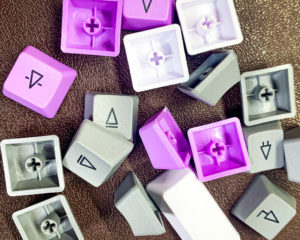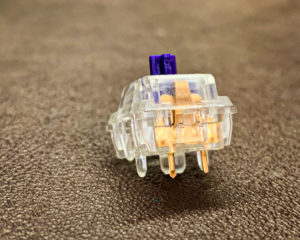Keyboards that ‘Click’ – All About Mechanical Keyboards
I had the chance to sit down with one of our technicians, Will Pike, to learn more about his hobby and craft – mechanical keyboards. I didn’t even know there were different kinds of keyboards, let alone some as complex as the mechanical keyboard. So, we dove right in to find out more.
I first asked how he even got into mechanical keyboards:
“As niche of a hobby as it is, I was browsing on Reddit on r/all – it came up in a post I saw and thought “That looks really cool”. I followed the subreddit and delved into the rabbit hole. It was 100% an accidental find, but now I can’t escape it.”
Just goes to show that Reddit has literally anything and everything. Next, Will gave me an overview of mechanical keyboards. What’s the main difference between mechanical and membrane (aka your standard $10 keyboard from Wal-Mart)? “…there isn’t much of a difference for functionality, it’s more of a ‘why not’ scenario.” Some companies tend to market their mechanical keyboards to “gamers” but it’s still a keyboard. Meaning that they all function as a keyboard, it’s just how they function and how you can (or can’t) customize them to your personal preferences. Mechanical keyboards “take your mundane, everyday thing and make it enjoyable.”
There are several different parts to the hobby – ergonomics is a big point of interest for a lot of people. You’ve seen those funky two-piece keyboards that look like they were bent in half with a steel pipe? Well, those split-designs are obtained by a mechanical keyboard.
“The wonderful thing about mechanical keyboards is that they help fit what YOU want out of it. It is very customizable – and that’s just scratching the surface.”
There are a few main parts to a mechanical keyboard: 
PCB – aka the brains of the keyboard
Switches – the things that register when you push down on a key
Keycaps – the things I’m pushing on right now as I type that tell me what letter is what
Case and Plate – the shell and cheese of the keyboard taco
To build a mechanical keyboard, all of these pieces must be soldered together. “I’ve done them in about 2-3 hours” says Will, the pro mechanical keyboard solderer.
With the switches being one of the main features of the mechanical keyboard, it’s important to know the three different kinds: Linear, Tactile and Clicky. “There is still debate on which one is the best – but they are subjective. My personal favorite is tactile but my wife prefers linear. It’s 100% preference.”

Linear – this switch has zero feedback when you push down on it.
Tactile – these have a small ‘bump’ when you push down on them, but no noise to go with it.
Clicky – as the name suggests, they make a ‘click’ sound caused by a bar that registers when you actuate the key.
“There’s a deeper side to the customization where people pull the switches apart and modify those individually – that can take a whole day in itself. That changes the feel of the key, the smoothness and responsiveness. People can also mix and match different parts of them as well, so it’s extremely customizable.”
Now, I’m sure you are wondering where you get all these super cool and customizable parts. Well, where does the U.S. import over $500 billion of goods from every year? Yep, China. There are various EU markets but they often have higher prices than China.
So, did China come up with the mechanical keyboard and all these fancy parts? Nope. That would be Germany. “The German company Cherry first patented the mechanical switch (in the 80’s) that we use a lot of today. Then, the patent lifted (in 2003) and all of a sudden, everyone started making switches in the same style and using those designs as a reference. There have been a lot of Chinese replications that are almost better actually, and at a cheaper price.” One of the biggest brands for switches today is Gateron.
Fancy parts and fancy companies must come with a fancy price, right? While the prices range depending on how customizable you go and the quality of products you use. Mechanical keyboards can range anywhere from $100 – $200. Unlike a lot of other things, it’s actually NOT cheaper to build these things yourself – although it is easier to get them fully customized if you do build it. Plus, it never hurts to learn a new skill!
“If you do want to go into it, I would definitely recommend the subreddit for it. There is a lot of accessible information on there and they provide a lot of good information.” You can check that subreddit out here.
At a glance, mechanical keyboards are just taller, bigger and ‘clicky-er’. But when you dive into the depths of the mechanical and technical aspects, you find quite an interesting piece of equipment.
All the best,
Bonny